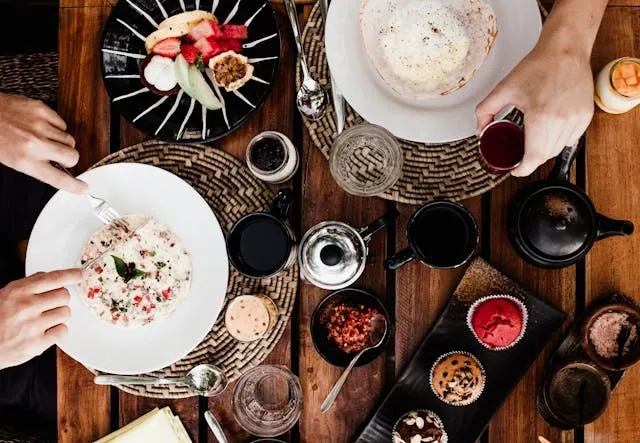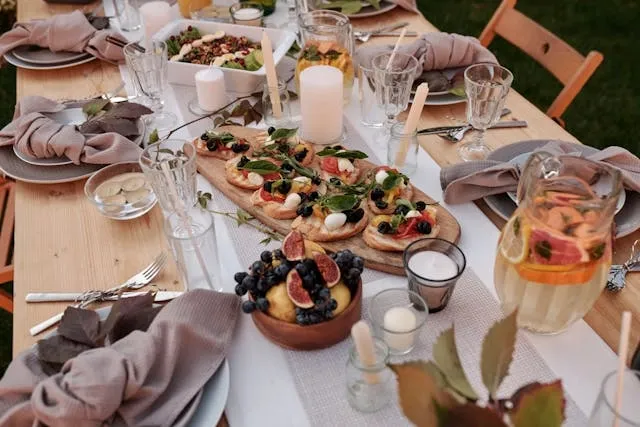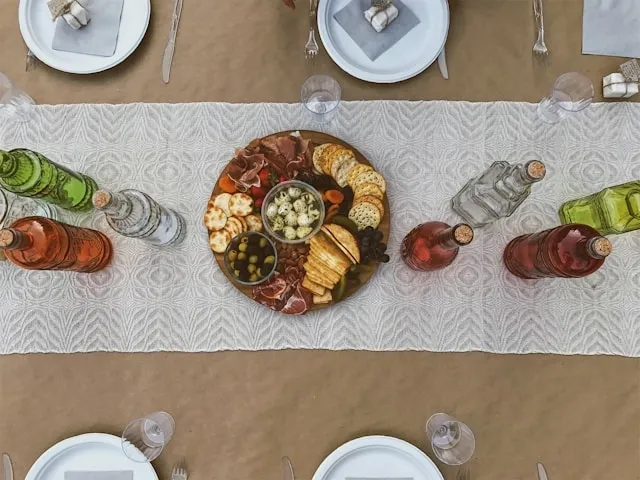How To Set A Table With A Runner And Placemats: Dining Etiquette & Combination Ideas For Casual Or Formal Occasions
In table runner etiquette, setting a table with a runner and placemats can add depth and style to your dining arrangement. This post explores how to use a table runner over a tablecloth for casual gatherings and formal events, outlining creative combinations and getting the right balance between aesthetics and functionality. Discover tips and insights for setting a table with runners and placemats to reflect your personal style and enhance the overall dining experience.

Key Takeaways
- Learning how to set a table with a runner and placemats is all about coordinating the sizes, colors, and designs for visual and practical cohesion.
- You can also add a tablecloth to the arrangement, combining the three tabletop elements for a layered arrangement that brings visual depth and harmony.
- The materials of runners and placemats should be coordinated, and there should be cohesion between their colors, textures, and patterns.
- There is some disagreement between traditional and modern attitudes to combining placemats and runners, but they can definitely be used in tandem to great effect.
- You may be able to repurpose other items as makeshift table runners for a unique, alternative look at your table settings.
- We supply high-quality custom table runners made from polyester, allowing you to choose the size, colors, patterns, and bespoke motifs for your table arrangement.
Table of contents
-
How To Set A Table With A Runner And Placemats
-
Can You Put A Table Runner Over A Tablecloth?
-
Table Runner Etiquette
-
How Do You Position A Table Runner With Placemats?
-
Coordinating Materials For Table Runners And Placemats
-
How To Set A Table With Table Runner And Placemats
-
Table Runner And Placemat Specifications
-
Traditional Vs. Modern Debate: How To Use Table Runners And Placemats
How To Set A Table With A Runner And Placemats
When you combine table runners and placemats, you can achieve a harmonious blend of style and functionality. The runner adds a decorative touch along your table’s center line, and the placemats complement it whilst providing individualized spaces for diners and helping protect the tabletop.You can use placemats with table covers in various ways, but here’s some advice on how to arrange them for a basic table setting:
- Lay the placemats in their designated positions.
- Position the table runner along the center line of the table, ensuring the overhang won’t interfere with the dining experience.
- Adjust accordingly to create symmetry and balance.
This combination adds visual appeal to your table and makes dining more organized and elegant. With different combinations of colors, textures, and shapes, you can create arrangements for both casual and formal occasions.

How Should A Runner Sit On A Table With Placemats?
When you set a table with a runner and placemats, the optimal balance between functionality and aesthetics is crucial. Traditionally, the runner should sit parallel to the table’s sides (the longer sides for a rectangular table), and there should be placements at either end. For a more contemporary look, you could experiment with diagonal or asymmetrical placements, particularly on round or oval tables.
Runner length is a crucial part of the puzzle.Your runner should extend a few inches beyond the placemats’ edges, but it shouldn’t hang low enough to interfere with diners’ movements. With our service, you can create custom designs to tailor the look to your needs and get a size/shape that complements your table.
Visual aids like images or diagrams that showcase different placement options can be helpful. They are a useful tool for making informed decisions about cohesive, visually-appealing table arrangement ideas with runners and placemats.
Can You Put A Table Runner Over A Tablecloth?
When you fully understand the differences between a table runner vs a tablecloth, you can comprehend how they can be used together for stylish table settings. The combination adds visual interest, protects against spills, and allows for easy customization. But there are some key considerations to be mindful of when you use it, so educate yourself on how to create visual harmony.
When layering, consider the following:
- Combine contrasting or complementary colors to create depth and dimension.
- Ensure the runner is narrower than the tablecloth.
- Consider a few inches of overhang at either end of the runner for a balanced look.
You can put a runner over a tablecloth to elevate your table setting with versatility and charm. But it is important to be mindful of achieving visual harmony between the two. The fabrics, colors, shapes, and patterns you choose will all make a big difference to the look and functionality, so make each choice carefully.
Create a unique table runner for your table
If you want your table runner to match the placemats you have, use our custom table runners to get the right look and create a cohesive table setting.
Table Runner Etiquette
Table runner etiquette revolves around the formality of the occasion and the aesthetic you want to achieve. For example, in formal settings like elegant dinners or holiday gatherings, it can be very effective to combine a tablecloth and table runner to achieve a sophisticated ambiance. For casual gatherings, however, using just one or the other will usually suffice.
Integrating tablecloths, table runners, and placemats offers versatility. Here are a few etiquette suggestions:
- Formal dinners: Layer a crisp white tablecloth with a matching or contrasting table runner and complement that with placemats in coordinating colors and patterns.
- Family brunch: Create a cozy atmosphere with a colorful tablecloth paired with a neutral runner and casual placemats.
- Outdoor gathering: Place a natural tablecloth alongside a vibrant runner and some outdoor-friendly placemats for a welcoming and relaxed atmosphere.
The Art Of Layering: Runners, Placemats And Tablecloths
There is an art to layering table runners, placemats, and tablecloths to add depth and dimension. For smaller tables or a casual vibe, a single layer like a table runner of some placemats usually offers a clean, uncluttered look that still protects tabletops.
For larger tables or more formal occasions, multiple layers adds a touch of elegance. Start with a tablecloth that offers a generous drape over the edges, followed by a complementary or contrasting table runner down the center. Position placemats on top, ensuring their look aligns with the table runner, perhaps with a slightly offset aesthetic for visual interest.
When you design custom table runners with us, you can choose colors and textures that harmonize with your dinnerware and surrounding decor. This enables a cohesive, inviting table arrangement that suits the occasion perfectly.
How Do You Position A Table Runner With Placemats?
To set a table with both a runner and placemats, begin by placing the table runner lengthwise down the center of the table. The runner will act as a visual anchor for your arrangement, providing a foundation for centerpieces or shared dishes. It should typically hang 6 to 10 inches over each end of the table for a balanced look.
Next, position each placemat so that it sits parallel to the edge of the table. You should ensure it is centered at every place setting. Placemats should never overlap the runner, unless your runner is particularly narrow. In most cases, the runner and placemats should sit side by side without touching, allowing each element to stand out while ensuring a clean layout.
Choose complementary colors and textures to tie the elements together. For example a natural linen runner pairs well with woven or cotton placemats, while a satin runner may call for something more refined like quilted or embroidered mats.
With this layered approach, you can offer both style and function, protecting the table while enhancing the visual appeal of your place settings. Our custom table runners can be the perfect solution to get the exact aesthetic you need for your table settings.
Want an elegant, memorable look for your runners?
When you work with us, you can add a unique monogram design to personalize your table runner and select the size and colors to make it look perfect.
Order hereCoordinating Materials For Table Runners And Placemats
To use table runners and placemats together effectively, you need to select fabrics that balance style and practicality. Cotton is a popular option, creating a classic look that is easy to clean and offers various colors and patterns. Custom linen table runners are also popular, combining with placemats in the same fabric for a natural texture, though more maintenance could be required. With its wrinkle-resistant, durable nature, polyester is an ideal solution for busy environments, and it can mimic the natural look of cotton.
When you are choosing colors and textures, consider the following for your dining ambiance:
- Soft, muted tones can create a tranquil atmosphere.
- Bold colors and intricate patterns add flair.
- Materials should complement each other between runners and placemats for visual cohesion.

How To Set A Table With Table Runner And Placemats
When you set a table with a runner and placemats, you tap into a versatile solution for creating captivating table settings. Popular choices include a centrally-placed table runner, anchoring the table’s decor, or one that hangs over the sides to impart a more relaxed, casual vibe that often works for everyday meals.
If you want a more innovative approach for your table setting, try placing the runner diagonally across the table for an eye-catching visual element. Placemats should be coordinated symmetrically along the table’s length, contrasting with the off-center alignment of the runner.
Ultimately, the placement of these elements has a significant impact on the table’s overall aesthetic. Experiment with different combinations, always keeping practicality in mind. You will find the optimal arrangement that complements your dining space and the tone of the occasion, whether formal or casual.
Arrangement For Formal Occasions
For formal occasions, you should arrange table runners and placemats meticulously to enhance the dining setting. Place your table runner along the table’s center line, allowing it to extend modestly beyond the edges for a refined touch. Placemats should be positioned symmetrically, aligning with the runner’s edges.
Other key table setting elements for formal occasions include:
- Silverware: placed neatly and evenly beside each placemat.
- Glassware: Positioned above the knives and forks.
- Napkins: Folded creatively or mounted on napkin rings for visual flair.
When designing items for formal occasions, like personalized wedding table runners, consider luxurious fabrics like damask or satin weaves, or showcase intricate patterns and a subtle sheen that mimic these fabrics. Such choices will elevate the visual appeal and contribute to a more memorable, refined dining experience for guests.
Casual Dining And Everyday Meal Setup
For casual dining, you can use table runners and placemats for a blend of style and practicality. Opt for durable, low-maintenance materials like cotton or polyester for easy cleaning. You can choose playful patterns and vibrant colors, and rotate your arrangements seasonally or modify them for casual gatherings, adding a touch of personality and dynamism to your table setting.
Generally speaking, you should arrange your table runner along the table’s center, with a slight overhang for a relaxed look. You can space out your placemats evenly along the table, ensuring they complement the runner’s design or the overall color scheme. With this casual approach to table runner etiquette, you create a welcoming atmosphere for family meals and informal gatherings, but retain an element of style and creativity in your space.
Save money on table runners for multiple tables
If you need to set more than one table and want a matching look, order custom bulk table runners to take advantage of our generous wholesale discounts.
Table Runner And Placemat Specifications
When exploring how to set a table with a runner and placemats, consider standard sizes for runners. A table runner size chart can be helpful, but standard sizes generally range from 12 to 18 inches wide and 36 to 108 inches long, depending on the dimensions of your table. Decide on the amount of overhang you want (if any) and be sure to double it for an equal drape at both ends.
For placemats, standard sizes are usually around 12x18 inches. You may also find square or circular options for different tastes. Aim to coordinate patterns and textures between your tablecloth, runner, and placemats to achieve visual cohesion. Solid colors can be mixed with patterns, or you can combine different fabric textures for added visual interest.
A good eye for sizing and design cohesion can enable you to create a visually-appealing, well-coordinated table setting. This will enhance your overall dining experience.
Traditional Vs. Modern Debate: How To Use Table Runners And Placemats
The debate between traditional and modern attitudes towards using table runners with placemats revolves around practicality and aesthetics. Traditionally, these two tabletop features are seen as separate items, each serving its own distinct purpose. But modern interpretations embrace the versatility of using them in combination for aesthetic and functional purposes.
Traditional guidelines may recommend that you choose between a table runner and placemats, but modern trends encourage the combination for a layered, dynamic table setting. There is a common misconception that they are not compatible, but they can actually complement each other wonderfully in terms of:
- Texture
- Color
- Style
Add them to formal and casual dining experiences to suit your personal preference and create the desired ambiance.

Creative Alternatives To Traditional Runners
It is possible to use creative alternatives to traditional table runners alongside placemats for a more personalized look. Scarves can be repurposed to make unique table runners, adding a soft, luxurious texture that may include an intricate pattern. Burlap, meanwhile, offers rustic charm that can be harnessed for a stylish, eco-friendly table runner for casual gatherings or outdoor occasions.
Another innovative idea is to use fabric remnants or vintage linens to create your own patchwork table runner. Blend different colors and textures for a whimsical, artsy look, or create a similar aesthetic with our custom polyester table runners. These alternatives can add a distinct character and personality to your dining space whilst demonstrating creativity and sustainability in your home decor. Explore different ideas and come up with something unique to you.
Make a lasting impression with our high-quality, eye-catching designs
Enhance your brandÔÇÖs presence at your next event with our stunning, personalized table covers
Order now and elevate your brand in style.
Make Your Custom Table CoversFrequently Asked Questions About How To Set A Table With A Runner And Placemats
How To Set A Table With A Runner And Placemats
If you want to use a table runner and placemats together for your table setting, you need to coordinate the sizes perfectly and choose complementary designs for a cohesive and balanced look and practical functionality.
Can You Put A Table Runner Over A Tablecloth?
Yes, a table runner can be placed on top of a tablecloth to create depth and dimension. You can choose complementary or contrasting colors, depending on the aesthetic you want to achieve, and think about dimensions for visual harmony.